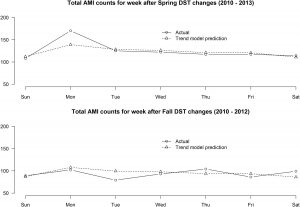
Image from quickmeme.com
This year, our Canadian Daylight Savings Time (DST) was March 10th and November 3rd . On the third of November, the time of day was automatically shifted forward an hour, giving us the freedom to sleep in for an extra 60 minutes.
On the other hand, on March 10th of this year, we were stripped of one hour of precious sleep. For me, this time of year is the worst because I have a pretty good sleep schedule and this change in time makes it really difficult to wake up during the first week following DST. Interestingly, this loss of one hour may be associated to an increased risk of heart attack.
What is Daylight Saving Time (DST)?
DST, an annual ritual where an hour of morning light is given in exchange for lowered energy use, is practiced in many countries across the globe. It began in Europe after World War I and spread to the rest of the world during World War II. In the following video, the writers of National Geographic dive into the origins of DST and introduce the negative effects of DST such as increased risk of heart attacks.
DST Linked to Increased Risk of Heart Attacks
As the video states, Daily Saving Time has been linked to increased heart attack incidents. This claim can be supported by a study published in BMJ (British Medical Journal), which looked into the relation between DST and heart attack cases. The scientists discovered that there was a big increase in reported heart attacks after the loss of an hour due to DST and a somewhat significant decrease in cases of heart attacks following the return to standard time.

Actual and predicted acute myocardial infarction (AMI), also known as heart attack, counts for the weeks after the spring and fall daylight savings time (DST) time changes. From BMJ Journal (Open Access Article)
In this study, the researchers collected data from 42 060 hospital admissions with acute myocardial infarction (heart attack) from the participating hospitals involved in the Blue Cross Blue Shield of Michigan Cardiovascular Consortium Percutaneous Coronary Intervention Quality Improvement Initiative (BMC2-PCI).
What they found was that there was a large increase in heart attack cases during the week after the loss of an hour due to DST, perhaps due to an abrupt change in the sleep–wake cycle and increased stress related to the start of a new work week, as can be seen in the top graph. In the bottom graph, their results indicate that there is a moderate decrease in heart attack cases following the week of DST where we get an extra hour of sleep.
Their data also indicate that DST may accelerate health conditions in vulnerable patients. This is controversial as people discuss the health and economic benefits of DST, with many suggesting that we stop doing this practice. If the cons outweigh the pros, I think that practicing Daylight Saving Time is unnecessary.
Should we Stop Practicing DST?
A lot of my friends from other countries didn’t even know Daylight Saving Time was a thing until they moved here. This is really interesting to me as I’ve lived here my whole life and thought everyone in the world did DST. In my opinion, there’s no need for this practice. Additionally, there are many other health-related studies that show the negative effects of DST such as a decline in productivity and performance in teenagers, increase in car crashes, and an increase in depressive episodes. As such, I believe that we should stop practicing DST.
-Jennifer Yu
